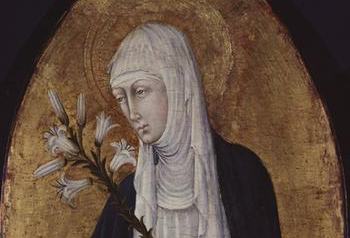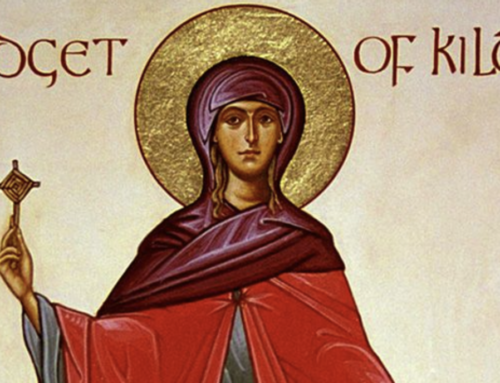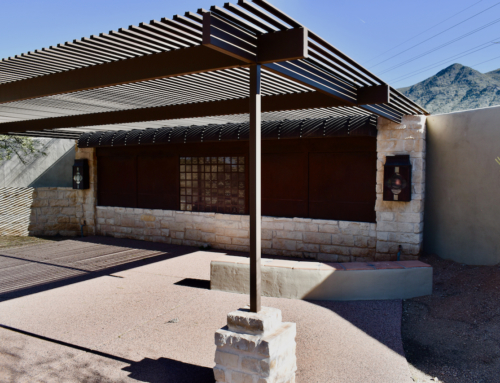by Steven Nemes (PhD candidate, Fuller Theological Seminary; adjunct professor; Grand Canyon University)
Catherine of Siena (1347-1380) was a lay member of the Dominican Order. She lived during a very tumultuous time in the history of the Roman Catholic Church, exercising an influence upon Pope Gregory XI during the time of the Avignon papacy and helping those who were sick and dying because of the Black Death. She was a twin, born to a mother who had already given birth to 22 children, half of whom having died. She devoted her life to God and served Him in the way that she considered best. For example, she was in the habit of giving away food and clothing without asking anyone’s permission, while never asking anything for herself. She was canonized in 1461. She was the first woman in Roman Catholicism (alongside Teresa of Ávila) to be declared a “doctor of the Church” as a result of her evident spiritual insight in spite of the fact she was never formally educated.
One of her most famous written works is called The Dialogue concerning Divine Providence. In this work, God speaks to her and teaches her about the love of God and its outworking in the divine governance of the world. More specifically, she spends quite some time teaching about the importance of intercessory prayer. I will briefly highlight some of the central teachings of St. Catherine on this topic.
Intercessory prayer is prayer made on behalf of another person, especially for that person’s salvation. Scripture teaches us to pray for others and that in doing so we follow the example of God: “First of all, then, I urge that supplications, prayers, intercessions, and thanksgivings be made for everyone… This is right and acceptable in the sight of God our Savior, who desires everyone to be saved and to come to the knowledge of the truth” (1 Tim. 2:1, 3-4). St. Catherine also teaches that intercessory prayer is a natural and essential expression of the Christian duty to love our neighbors. Christians are called to love others, even those who do not know the truth and who live in sin. And the most impressive way in which this love can be manifested is precisely through prayer for the other. God Himself listens to the prayers of His servants and acts for the sake of the salvation of those for whom they pray. God tells St. Catherine:
“Pressed by my servants’ prayers, I look on [sinners] and give them light. I rouse the dog of conscience within them. I make them sensitive to the perfume of virtue and give them delight in the fellowship of my servants. Sometimes I allow the world to show them its true colors, letting them feel all sorts of emotions, so that they may know how inconstant it is and be more eager to seek their homeland in eternal life” (Dialogue §4).
God emphasizes to Catherine that the one goal He pursues in all of his providential governance is the salvation of the human creature: “The eye cannot see, nor the tongue tell, nor can the heart imagine how many paths and methods I have, solely for love and to lead them back to grace that my truth be realized in them!” And yet although God admits that He is “pressed” by His servants’ prayers, this does not mean that He is somehow being forced to do something He otherwisewouldn’t want to do. Rather, God tells St. Catherine: “I do not spurn their tears and sweat and humble prayers; no, I accept them, since it is I who make them love and fill them with grief over the damnation of souls.”
Neither does this mean that salvation is deterministic or automatic. God provides grace, but human beings must freely cooperate with that grace for the sake of salvation. God’s servants can pray for
sinners and God will give sinners grace in the ways He described earlier as a result of those prayers, but if the sinners themselves do not take advantage of the grace provided for them, the result is a bad one: “through their own wickedness and hardness[, they] have, with the hand of free choice, encrusted their hearts in a diamond rock that can never be shattered except by blood.”
God again and again encourages St. Catherine never to give up in praying for others: “Never relax your desire to ask for my help. Never lower your voice in crying out to me to be merciful to the world. Never stop knocking at the door of my Truth by following in his footsteps… Through this lamentation and crying it is my will to be merciful to the world. This is what I require of my servants and this will be a sign to me that you love me in truth. Nor will I spurn your desires, as Ihave told you” (Dialogue §107). God encourages us to pray and never to give up in prayer because He himself inspires these prayers and wants to make use of our prayers for the healing of the world. He calls us to perseverance in intercession: “You see, you have bound me with that chain [of intercession] — and I myself gave you that chain because I wanted to be merciful to the world. I put into my servants a hunger and longing for my honour and the salvation of souls so that I might be forced by their tears to soften the fury of my divine justice” (Dialogue §15).
This is St. Catherine’s basic understanding of intercessory prayer. It is a fulfillment of the commandment that we love our neighbors. More than that, it is a tool that God uses in His providence in order to accomplish His one and only goal: the salvation of sinners. In this way, God gives us the tremendous honor and privilege of becoming His “hands and feet” in the world when He acts to save on the basis of our prayers. We become “participants” in His divine work as a gift of His own goodness. And what a tremendous honor and gift that is!
Many times in life it is possible to feel discouraged and to lose interest in praying for others. It could be that we have no compassion or pity for others who are lost and in the dark without God. In those situations, St. Catherine reminds us that God has called us to love His creatures just as He does, and this means that we must care about them and be concerned for their salvation. Other times it happens that our prayers for others seem to go unanswered for many months or even years. In response, St. Catherine teaches us two things. First, it must be remembered that human beings have freedom of the will, so that they must cooperate with God in order to be saved. Salvation is not automatic! But second and more importantly, it is nevertheless God Himself who puts within us the desire to pray for the salvation of others, so that we should be confident that He hears our intercessions and will not deny us the object of our desire. We are not going against God’s wishes when we ask Him to have mercy on sinners or to save them: indeed, we are fulfilling His will by doing so, because He wills that all people be saved and come to the knowledge of the truth. And what is most wonderful of all is that God gives us the opportunity to perform an act which is so simple and easy, as easy as uttering a few words, so that through our prayers He will bring about the salvation of others. God gives us the opportunity to be His co-laborers in the world, if only we would pray and beg Him to be merciful!
So St. Catherine would teach us that God Himself implores us to pray for others. We should always beg of God, “whose property it is always to be merciful,” that He save those creatures of His whom He loves so dearly and who are lost in darkness without Him!






